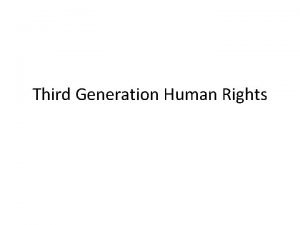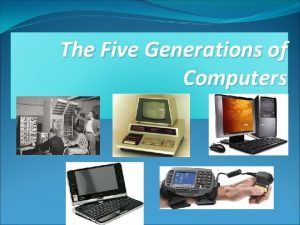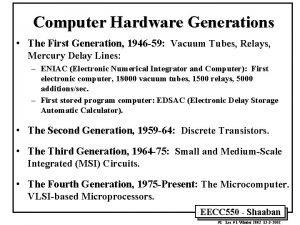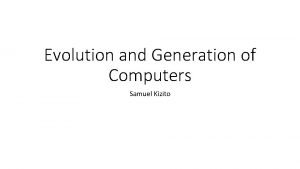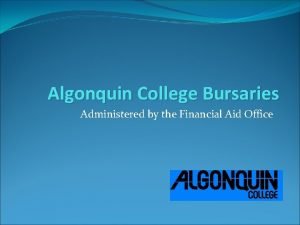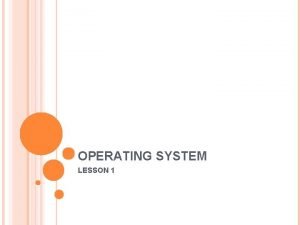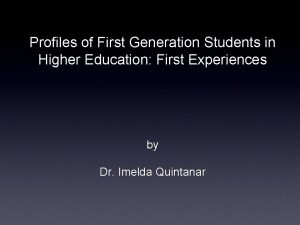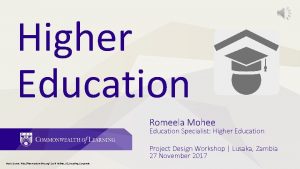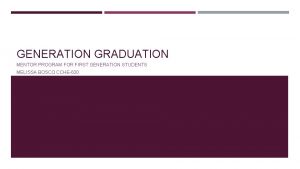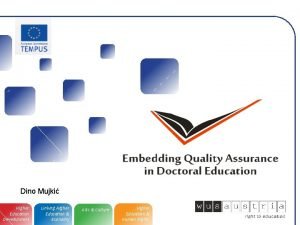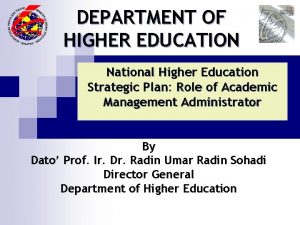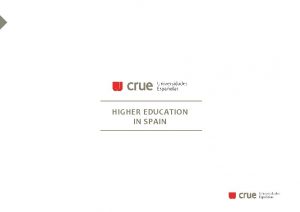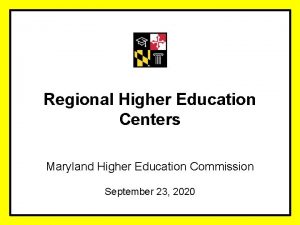Profiles of First Generation Students in Higher Education

















- Slides: 17

Profiles of First Generation Students in Higher Education: First Experiences by Dr. Imelda Quintanar

First Generation, First Year Students - Fall 08 African. American First generation students (parents without any college experience) Students whose parents had some college Students whose parents have Bachelor's or higher degree Subtotals No Response Totals Others/Unknown includes 1 American Indian 68 22. 8% 92 30. 9% 5 15. 2% 7 21. 2% Hispanic 321 74. 5% 54 12. 5% 12 26. 1% 7 15. 2% Non. Resident Alien 50% 5. 3% 1 0 28. 6% 171 19. 8% 37. 1% 260 30. 2% 100. 0% 862 100. 0% 21 63. 6% 56 13. 0% 27 58. 7% 5 26. 3% 100. 0 % 3 5 35 333 3 36 431 26 457 46 5 51 19 34. 30% 431 46. 3% 33 Tot als 1 2 13 68. 4% 1 Others/Unkno wn 1 3 138 298 White Asian/ Pacific Islander 2 7 78 21 4 2 940

Student Enrollment by Ethnicity at CSUDH Fall 2008 N % African 3, 378 30. 3% American 38 0. 3% Indian Asian 709 6. 4% Filipino/Pacific 568 5. 1% Is Hispanic 4, 405 39. 5% CSUDH Institutional Research, Assessment and Planning White 2, 065 18. 5% Subtotal 11, 163 100. 0%

President Obama’s First Address to Congress

First Generation Definition Billson and Terry (1982) defined first generation college students as those whose parents did not attend college, whereas second generation and non-first generation (traditional college students) have at least one parent who graduated from a 4 -year university. Journal of College Counseling Publication Date: March, 2007

Postsecondary Enrollments First generation students are more likely to delay postsecondary entry, begin at a 2 - year institution, and attend part time and discontinuously. National Center for Education Statistics U. S. Department of Education, Institute of Education Sciences NCES 2005 -171

First Generation Students U. S. Department of Education Institute of Education Sciences NCES 2005 -171. Source: U. S. Department of Education, National Center for Education Statistics, National Education Longitudinal Study of 1988 (NELS: 88/2000), “Fourth Follow-up, Postsecondary Education Transcript Study (PETS), 2000. ”

First In The Family http: //firstinthefamily. org

Challenges for First Generation Students Challenges that are present for first generation students stem from one of the following: • Lack of parental experiences in higher education • Lack of ability to persist • Lack of Human and Cultural Capital • Lack of ability to finish academic programs

Lack of Parental Experiences in Higher Ed • Students whose parents had not attended college received less help from their parents in applying to college, and were not more likely to receive help from their schools (Choy, 2001). While going to college may be seen as a rite of passage for any student, it marks a significant separation from the past for those who are the first in their families to do so. Parents, siblings, and friends who have no experience of college or its rewards may be non-supportive. First-generation students may not have or be able to create a designated place or time to study at home, and they may be criticized for devoting time to school rather than family responsibilities (Hsiao, 1992).

Lack of Parental Experiences in Higher Ed Family surveys conducted by the Education Department show that more than 9 out of 10 Hispanic parents expect their children to attend college – a figure in line with results for both black and white parents. But Hispanic children are much less likely than white children to have a parent that attended college. More than two out of five Hispanic freshmen at four year colleges are the first in their family to attend college, compared with about one out of five white freshmen (Schmidt, 2003). Families of first-generation students sometimes discourage them from going to college and this can lead to alienation from family support. First-generation students are also susceptible to doubts about their academic and motivational abilities; they may think they are not college material. Overcoming these personal challenges is crucial to a successful transfer to a four-year college (Striplin, 1999).

Lack of Ability to Persist Comparative studies (Bui, 2002; Riehl, 1994) have indicated that first-generation college students often encounter more challenges than do their peers. This body of research indicates that first-generation college students experience difficulties prior to and during their college experience that make them vulnerable to lower academic performance (Bui, 2002) and problematic transitions as they adjust to college (Terenzini, Springer, Yeager, Pascarella, & Nora, 1996). Bui found that a significant portion of first-generation college students encountered challenges with respect to being predominantly from a lower socioeconomic strata, coming from an underrepresented ethnic group, and speaking a language other than English in the home (Bui, 2002).

Lack of Human and Cultural Capital Low-income, minority, and first-generation students are especially likely to lack specific types of “college knowledge. ” They often do not understand the steps necessary to prepare for higher education which include knowing about how to finance a college education, to complete basic admissions procedures, and to make connections between career goals and educational requirements (Vargas, 2004). Students from a low-income and first-generation background face obstacles that include: lack of knowledge of the campus environment, its academic expectations, and bureaucratic operations; lack of adequate academic preparation, and lack of family support. First-generation students may encounter a cultural conflict between home and college community (Thayer, 2000). Warburton, Bugatin, and Nunez (2001), who reported that first-generation college students perceived themselves as less prepared, lacked basic knowledge about postsecondary education, and worried more about financial concerns (Bui, 2002; Fallon, 1997) compared with traditional college students.

Lack of Ability to Finish Academic Programs Other studies have found that first-generation college students had lower academic performance (Mitchell, 1997; Riehl, 1994), more problematic transitions (Terenzini et al. , 1996), and higher levels of attrition (Brooks. Terry, 1988; Thayer, 2000; York-Anderson & Bowman, 1991) than did traditional college students. As in earlier studies (Ishitani 2003), this report [NCES] found that firstgeneration students had some family and background characteristics that are associated with attrition. Compared with their peers whose parents were college graduates, first-generation students were more likely to be Black or Hispanic and to come from low-income families. They were less prepared academically for college as demonstrated by their lower rates of taking higher-level mathematics courses in high school, their lower senior achievement test scores, and their lower college entrance examination scores.

First Generation Students U. S. Department of Education Institute of Education Sciences NCES 2005 -171. Note: In this table and all subsequent tables in this report, only postsecondary students for whom complete transcripts were available and parents’ education was known are included. Details may not sum to totals because of rounding. Standard error tables are available at http: //nces. ed. gov/das/library/reports. asp. Source: U. S. Department of Education, National Center for Education Statistics, National Education Longitudinal Study of 1988 (NELS: 88/2000), “Fourth Follow-up, Postsecondary Education Transcript Study (PETS), 2000. ”

Lack of Ability to Finish Academic Programs First generation students are at a distinct disadvantage in gaining access to postsecondary education. Even those who overcome the barriers and do enroll have difficulty remaining enrolled and attaining a degree (Horn and Nuñez 2000; Nuñez and Cuccaro. Alamin 1998; Warburton, Bugarin, and Nuñez 2001). At 4 -year institutions, first-generation beginning students are twice as likely as students whose parents had a bachelor’s degree to leave before their second year (23 vs. 10 percent). Even taking into account other factors associated with not returning, such as delaying enrollment after high school or working full-time, and also taking into account financial aid, gender, race/ethnicity, etc. , first generation status was still a significant indicator of a student leaving before their second year (Choy, 2001).

Q&A
 First gen antipsychotics
First gen antipsychotics We worship you hallelujah
We worship you hallelujah Surveying course of rizal
Surveying course of rizal First generation game consoles
First generation game consoles What are third generation rights
What are third generation rights 6th generation of computer
6th generation of computer First generation of computer advantages
First generation of computer advantages Hardware generation
Hardware generation Mark of the four waves
Mark of the four waves Sar of cephalosporins
Sar of cephalosporins Oral hypoglycemic drugs classification
Oral hypoglycemic drugs classification First generation of rights
First generation of rights What type of computer is this
What type of computer is this L
L First generation cephalosporin
First generation cephalosporin First generation cephalosporin
First generation cephalosporin Algonquin financial aid contact
Algonquin financial aid contact First generation of operating system
First generation of operating system




